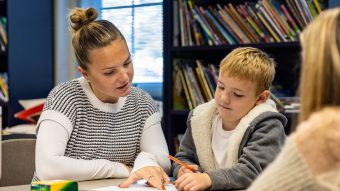January 27, 2021
Contact: Sara Diedrich, 573-8823243, diedrichs@missouri.edu

Mili Kuruvilla-Dugdale has inadvertently become the mentor she never had as a student — and her mentees at the University of Missouri, where she is an assistant professor of speech, language and hearing sciences, couldn’t be more grateful.
“I’m lucky to have her in my life as a mentor and as a friend,” said Alexandra Linderer, a second-year MU graduate student in speech, language and hearing sciences. “Believe me, I wouldn’t be where I am today without her encouragement and support.”
Kuruvilla-Dugdale recently received the 2020 Outstanding Undergraduate Research Mentor of the Year Award. She directs the Neurogenic Communication Disorders Laboratory in the School of Health Professions where she and students like Linderer study the loss of communication skills in patients with ALS and Parkinson’s disease.
In the past six years, Kuruvilla-Dugdale has mentored 45 undergraduates, including a McNair Scholar, three honors thesis students and a Discovery Fellow. She sees mentoring as an important way of training the next generation of researchers and clinicians in her field.
“I take this responsibility very seriously because our field needs well-trained, curious and confident leaders,” she said.
Kuruvilla-Dugdale’s style of mentoring is one she developed on her own.
In India, where she received her undergraduate and master’s degrees, and later in Australia, where she earned a doctorate, mentoring was more hands-off. It wasn’t until Kuruvilla-Dugdale arrived at the University of Nebraska-Lincoln for post-doctoral work in speech physiology that she experienced a personal connection with a mentor. To this day, she continues to reach out to that mentor for guidance.
“I’ve developed a style of mentoring I never had,” Kuruvilla-Dugdale said. “Inadvertently, I have become the mentor I wished I had to navigate through college and my career path.”
Linderer, who grew up in Festus, Missouri, and graduated from high school in a class of 80, was overwhelmed when she first arrived at Mizzou. Although she became involved with some campus organizations during her first two years, it wasn’t until her junior year — when she joined Kuruvilla-Dugdale’s lab — that Linderer felt a deep connection to a faculty member and by extension, her lab mates.
It was Kuruvilla-Dugdale’s willingness to shepherd Linderer and other students through the research process and guide them with graduate training options that revealed her mentor’s commitment and compassion.
“It was great to have someone there who was willing to sit down with us and go through each step,” Linderer said. “She was willing to put time and effort into every little piece to make sure we got excellent research training and we pursued graduate education in good programs.”
Kuruvilla-Dugdale believes that mentoring is a two-way street: While she benefits immensely from the students’ help in the lab, Kuruvilla-Dugdale is there to provide a research community where students can learn and grow professionally.
“The more connected they feel to the lab, the more invested they become in the research,” she said. “I’ve tried to create a supportive environment for my mentees to be intellectually curious and where they can cultivate a sense of belonging and shared purpose.”
Linderer said Kuruvilla-Dugdale’s interest in her as a student and person has inspired her to work harder and expect more from herself.
“She is constantly asking how our families are,” she said. “She remembers little details about our lives outside of school. She is genuinely interested in us as people, not just students.”



